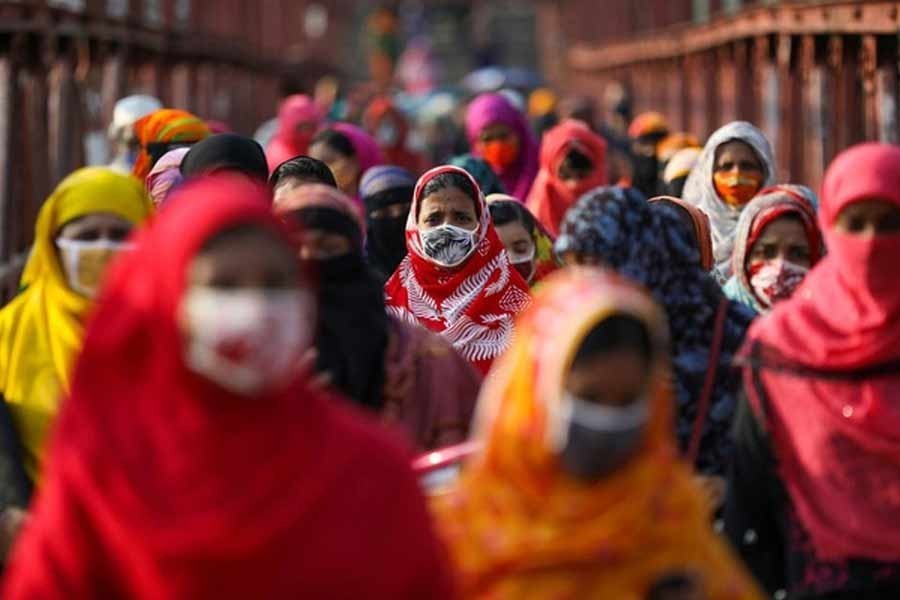Those whom God wishes to destroy, he first makes mad ---Euripides
In all men and women there is a fatal attraction, like moth to flame, for things forbidden. The lure is irresistible for some but those who can win over the temptation endure. Fortunately, the human kind's weakness to give in to invitation of self-annihilation is limited to a small proportion of its members.
The general human streak of non-compliance was on display almost everywhere on the globe. When the pandemic was wreaking havoc in the United States of America, the United Kingdom and France either students of universities partied before catching the virus or people demonstrated against lockdowns. Former US president Donald Trump was adamant not to wear even a mask against expert advices until he got Covid-19.
At home the streams of people rushing for home and making their reverse journeys to the capital at times gave an impression that they too were under the compulsion of a fatal attraction. But in most cases it was not because the kind of arrangement that could help avoid their unnecessary movement was simply absent. Most of those who left Dhaka for village homes before the 'strictest lockdown' could not help doing so, because they did not have enough savings to withstand the uncertain days ahead. In villages at least they may not have to starve, they reckoned. This explains the mass exodus. True, there are always some chameleon characters who take advantage of such emergencies and join the rank.
However, people's unrestrained movement during the lockdown right now defies rationality. Pictures of people detained or kept standing on roadside or footpaths for violation of lockdown directives have been carried in print media and shown on the electronic ones. The detained pedestrians could not put forward any plausible reason for their movement outdoor. Then there are reports of realising fines to the tune of hundreds of thousands of Taka from such people and drivers and owners of private cars. In some places cars were temporarily confiscated for their operation on road in defiance of the lockdown. On Monday, there was a picture of traffic jam in the Banani section of the Airport Road. A reporter on a private TV channel was heard quoting the leader of a patrolling law enforcement team that it was impossible to control people's movement unless they themselves became aware of the danger. At least one Bangla contemporary headline echoed the frustration by lamenting that by no means people can be persuaded to stay home. In kitchen market of the city the rush is as usual and hardly anyone cares for physical distancing; even only a few of the vendors and sellers wear masks. Before the local backyard tea stalls or restaurants, the rendezvous of young Romeos and Juliets in the afternoon gives the impression that there was no virus here.
All this is happening at a time when both death from and infection of coronavirus are alarmingly on the rise. Indeed, insanity on the part of leaders and policymakers the world over has pushed the planet to a tight corner where the environment and ecology have become extremely fragile. They are yet to realise the danger of the global warming that now warrants not only arresting but also reversing. Environmentalists and climatologists have long warned of the fatal consequences if the climate change cannot be addressed. More pandemics like this are on the cards.
Those people punished for getting out on the city roads without emergencies may be the tiny edition of recklessness for self destruction. But individuals make a group and groups a community, a community a society or people and ultimately the world population. Euripides has invoked God for making someone insane but insanity is innate and human responsibility is to tame it, overcome it to make civilisation strong enough against frailties.
Education and cultural enlightenment should act as the best defence against moral degradation and aggression. This world has more wealth than is needed for the sustenance of its population. But in the absence of rational use of wealth, food and other necessaries, a decent living eludes the majority of the population everywhere. A monopoly system is at work to deprive them of the basic human needs. This can happen only because the privileged are insensitive enough to make mountains of wealth at the cost of the struggling millions. Had the affluent people shared a small proportion of their wealth or there were an arrangement for taking best care of the worries of those people who had to leave the city fearing their ordeal during the lockdown, villages could perhaps avoid the current surge of Covid-19.
Now the question is, if Bangladesh is also heading for a nightmarish scenario like the one India has already encountered? Signs are alarming and point to that end. Now the pathogen is on the rampage in villages where medical facilities are largely absent. Patients will die without medical intervention and only a few who can afford the outrageous cost of transportation and treatment in cities will try their luck. But with no guarantee they will survive the ordeal. This unfolds a terrifying picture because once villages come to a halt, the cities or the capital too will become inert.


